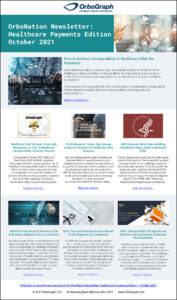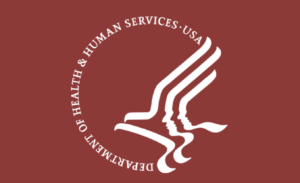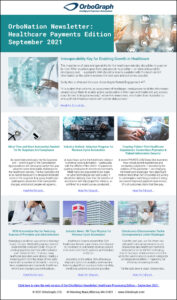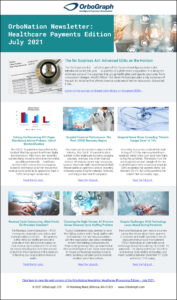Medical Lockbox
In case you missed it, over the past month, we have published incredible content on our OrboNation Blog and Modernizing RCM with AI. Review the latest OrboNation Newsletter online or via PDF download.
Read MoreThe No Surprise Act continues to make waves ahead of its adoption. We’ve reported updates recently related to the challenges ahead for the healthcare industry in complying with the proposed rules, including advanced EOBS. More specifics of the No Surprise Act are now coming into focus. Revcycle Intelligence reports: The NPRM titled “Reporting Requirements Regarding Air Ambulance Services, Agent and Broker Disclosures, and Provider Enforcement” seeks to codify existing penalties in the Public Health Service (PHS) Act for violations of Part E of title XXVII.
Read MoreDaily Host News takes a look at a topic we consider integral to the future of the healthcare industry, and that is INTEROPERABILITY. As important as it was previous to the COVID emergency, interoperability is now absolutely crucial in a pandemic environment. Their definition of INTEROPERABILITY is as follows:
Read MoreAccording to an AKASA-commissioned survey that included 400 chief financial officers and revenue cycle leaders at hospitals and health systems in the United States, with responses collected between May 27 and June 28, 2021, the number of health systems using revenue cycle automation has increased by 12% since last year. RevCycleIntelligence.com reports that the COVID…
Read MoreIn case you missed it, over the past month, we have published incredible content on our OrboNation Blog and Modernizing RCM with AI. Review the latest OrboNation Newsletter online or via PDF download.
Read MoreAs noted here previously, the No Surprises Act — which is part of the Consolidated Appropriations Act introduced earlier this year — presents some formidable challenges to the healthcare industry. The No Surprises Act is so named because it is designed eliminate some of the surprises that group health plan participants encounter from unexpected charges, which most people will agree is certainly a needed solution. However, as reported at HealthcareDive.com, payers and hospitals are asking for more time to get their “ducks in a row” in preparation to meet the new requirements:
Read MoreManaging a pandemic was and is a challenge in any industry. Medical Economics recently examined the pressure COVID-19 put on medical practices and their administrative staff. Before COVID-19 struck, many healthcare providers were already nearing a breaking point from the stress of their jobs. Faced with a number of demands – evolving laws, regulations and standards; healthcare reform and changing payment policies; too many administrative tasks; balancing increased patient expectations as healthcare consumers with limited time for patient interactions – providers and their staff were already suffering burnout at record levels.
Read MoreOver the past year, our R&D team has delivered many enhancements to our OrboAccess and our Healthcare Payments Automation Center (HPAC) technology. One of the major enhancements offers the ability for users/clients to custom categorize correspondence letters — improving the efficiency of working denials.
Read MoreIn case you missed it, over the past month, we have published incredible content on our OrboNation Blog and Modernizing RCM with AI. Review the latest OrboNation Newsletter online or via PDF download.
Read MoreThe problem, to be specific, is unexpected bills and the ability of patients — now responsible for so much more out-of-pocket medical expenses — to pay. Physicians are finding themselves with a pile of unpaid bills that is growing by the month. To begin attacking this challenge, Mr. Colabella suggests “front-loading” expectations as much as…
Read More








